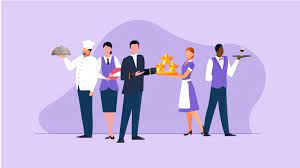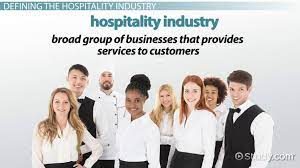Hospitality Consulting: Elevating the Art of Hospitality
In the ever-evolving world of hospitality, businesses are constantly seeking ways to enhance their guest experiences, streamline operations, and stay ahead of the competition. This is where hospitality consulting comes into play – a valuable resource that helps establishments navigate the complex landscape of the industry and unlock their full potential.
Hospitality consulting firms are comprised of seasoned professionals with extensive knowledge and expertise in various aspects of the field. These experts understand that exceptional service is at the heart of any successful hospitality venture. They work closely with businesses to develop tailored strategies that align with their unique goals, values, and target market.
One key area where hospitality consultants excel is in enhancing guest experiences. They understand that today’s travelers seek more than just a place to rest their heads – they crave memorable experiences that leave a lasting impression. Consultants analyze every touchpoint along the guest journey, from online booking processes to check-in procedures and beyond, identifying areas for improvement and implementing innovative solutions.
Moreover, hospitality consultants assist in crafting authentic brand identities. They recognize that successful establishments must differentiate themselves in a crowded market by showcasing their unique story and values. By conducting thorough market research and competitor analysis, consultants help businesses carve out their niche and create compelling brand narratives that resonate with target audiences.
Operational efficiency is another crucial aspect addressed by hospitality consulting firms. From optimizing staffing levels to implementing efficient inventory management systems, consultants identify opportunities to streamline operations without compromising on quality. By leveraging technology and best practices, they help businesses achieve greater productivity and cost-effectiveness.
Furthermore, hospitality consultants provide valuable insights on industry trends and emerging markets. With their finger on the pulse of the ever-changing landscape, they equip businesses with knowledge that enables them to adapt swiftly to new demands and capitalize on emerging opportunities.
Collaboration is key when it comes to hospitality consulting. Consultants work closely with business owners and managers as trusted partners throughout the process. By fostering open communication and a deep understanding of the client’s vision, consultants ensure that their strategies are aligned with the overall objectives and culture of the establishment.
In a world where guest expectations continue to rise, hospitality consulting has become an indispensable resource for businesses striving to excel. By leveraging the expertise of industry professionals, establishments can elevate their service offerings, optimize operations, and ultimately create exceptional guest experiences that keep customers coming back time and time again.
So, whether you are a small boutique hotel or a large resort, a restaurant or a catering company, hospitality consulting offers invaluable support in navigating the ever-changing landscape of the industry. Embrace this opportunity to enhance your business and unlock its full potential in the art of hospitality.
Frequently Asked Questions about Hospitality Consulting
- What is the future of hospitality consulting?
- What do you need to be a hospitality consultant?
- What is a consultancy in a hotel?
- What does a hospitality consultant do?
What is the future of hospitality consulting?
The future of hospitality consulting holds exciting possibilities as the industry continues to evolve and adapt to emerging trends and challenges. Here are some key aspects that may shape the future of hospitality consulting:
- Technology Integration: As technology continues to revolutionize the hospitality industry, consultants will play a crucial role in helping businesses navigate this digital transformation. From implementing advanced guest experience platforms to leveraging data analytics for personalized marketing strategies, consultants will assist establishments in harnessing the power of technology to enhance operations and deliver exceptional guest experiences.
- Sustainability and Responsible Practices: With increasing awareness about environmental sustainability and responsible practices, hospitality consulting will likely focus more on helping businesses adopt eco-friendly initiatives. Consultants will guide establishments in implementing sustainable practices, reducing waste, conserving resources, and meeting the growing demand for eco-conscious travel experiences.
- Personalization and Customization: The future of hospitality is all about personalization. Hospitality consultants will help businesses tailor their offerings to meet the unique preferences and needs of individual guests. By leveraging data analytics and guest profiling, consultants can assist establishments in creating personalized experiences that foster guest loyalty and satisfaction.
- Experience Design: In an era where experiences are highly valued by travelers, hospitality consulting will place greater emphasis on experience design. Consultants will work closely with businesses to curate immersive experiences that go beyond traditional services, incorporating elements such as local culture, wellness activities, culinary adventures, and interactive technologies.
- Crisis Management and Resilience: The COVID-19 pandemic has highlighted the importance of crisis management in the hospitality industry. In the future, consultants will likely play a vital role in helping businesses develop robust contingency plans, ensuring resilience against unforeseen events such as pandemics or natural disasters. Consultants will assist establishments in implementing flexible operational models and crisis communication strategies to navigate challenging times effectively.
- Global Market Expansion: As travel becomes more accessible worldwide, hospitality consulting firms may expand their reach beyond local markets. With an increasing number of businesses looking to expand internationally, consultants will provide valuable insights on cultural nuances, market trends, and regulatory requirements in different regions, facilitating successful global expansion.
- Training and Skill Development: In a rapidly evolving industry, continuous training and skill development will be essential for hospitality professionals. Consultants will offer tailored training programs to enhance the capabilities of employees, ensuring they are equipped with the necessary skills to deliver outstanding service and adapt to changing guest expectations.
Overall, the future of hospitality consulting is likely to revolve around leveraging technology, embracing sustainability, personalizing experiences, managing crises effectively, expanding globally, and fostering continuous skill development. By staying at the forefront of industry trends and challenges, consultants will play a pivotal role in helping businesses thrive in an ever-evolving hospitality landscape.
What do you need to be a hospitality consultant?
To become a hospitality consultant, several key skills, qualifications, and experiences are typically required. Here are some of the essential elements:
- Expertise in the Hospitality Industry: A deep understanding of the hospitality industry is crucial. This includes knowledge of various sectors such as hotels, restaurants, event management, tourism, and more. Experience working in different areas of hospitality provides valuable insights into industry dynamics and best practices.
- Strong Business Acumen: Hospitality consultants need to possess a solid grasp of business principles and financial management. They should understand revenue management, cost control strategies, budgeting, forecasting, and other financial aspects relevant to the industry.
- Analytical Skills: The ability to analyze data and identify trends is vital for a hospitality consultant. They must be adept at conducting market research, competitor analysis, and performance evaluations to provide actionable insights for their clients.
- Communication and Interpersonal Skills: Effective communication is essential when working closely with clients from diverse backgrounds. Hospitality consultants must be able to listen actively, ask pertinent questions, and clearly articulate their recommendations in a way that clients can understand.
- Problem-Solving Abilities: As consultants encounter various challenges during their engagements, strong problem-solving skills are crucial. They should be able to think critically, identify issues or inefficiencies within an organization’s operations or guest experiences, and develop innovative solutions.
- Flexibility and Adaptability: The hospitality industry is dynamic and constantly evolving; therefore, consultants must be adaptable to change and open to new ideas. They should stay updated on emerging trends, technologies, and best practices within the industry.
- Project Management Skills: Hospitality consultants often work on multiple projects simultaneously with different timelines and deliverables. Effective project management skills help them prioritize tasks efficiently while ensuring deadlines are met.
- Education and Professional Qualifications: While not mandatory, having a degree or certification in hospitality management or a related field can provide a foundational understanding of the industry. Additionally, professional certifications from recognized organizations, such as the Hospitality Sales and Marketing Association International (HSMAI) or the Institute of Hospitality (IOH), can enhance credibility.
- Industry Networks and Experience: Building a network within the hospitality industry is valuable for consultants. It allows them to stay connected with industry professionals, access resources, and gain insights into emerging trends. Prior experience working in different roles within hospitality can also provide a comprehensive understanding of operations and guest expectations.
- Continuous Learning: The hospitality industry is ever-evolving, so consultants must have a mindset of continuous learning. Staying updated on industry trends, attending conferences or workshops, and seeking opportunities for professional development are essential to maintain expertise in this field.
While these qualities are important for aspiring hospitality consultants, it’s worth noting that individual experiences and specific client requirements may vary. Adaptability, a passion for service excellence, and a genuine desire to help businesses succeed are also key attributes that contribute to becoming a successful hospitality consultant.
What is a consultancy in a hotel?
A consultancy in a hotel refers to the services provided by external experts or consulting firms to assist the hotel in various areas of its operations. These consultants are experienced professionals who bring their expertise and industry knowledge to help hotels improve their performance, efficiency, and overall guest experience.
Hotel consultancies offer a wide range of specialized services tailored to the specific needs of each establishment. Some common areas where hotel consultancies provide assistance include:
- Strategic Planning: Consultants work with hotel management to develop long-term strategies that align with the hotel’s goals and market trends. They conduct market research, analyze competition, and help define the hotel’s unique selling points.
- Operational Efficiency: Consultants evaluate operational processes and procedures within the hotel, identifying inefficiencies and recommending improvements. This may include optimizing staffing levels, implementing effective training programs, or streamlining workflows.
- Revenue Management: Consultants provide guidance on pricing strategies, revenue optimization techniques, and distribution channel management. They analyze market demand patterns and suggest ways to maximize revenue through effective pricing strategies.
- Sales and Marketing: Hotel consultancies assist with developing comprehensive sales and marketing plans to increase brand visibility and attract more guests. This may involve conducting market analysis, creating targeted marketing campaigns, or optimizing digital marketing efforts.
- Guest Experience Enhancement: Consultants focus on improving guest satisfaction by evaluating all touchpoints throughout the guest journey. They provide recommendations on enhancing customer service standards, personalizing guest experiences, and implementing feedback mechanisms.
- Financial Analysis: Hotel consultancies help analyze financial data to identify areas of improvement in cost control, budgeting, forecasting, and profitability analysis. They offer insights into financial performance benchmarks within the industry.
- Sustainability Initiatives: With growing awareness of environmental concerns, consultants can advise hotels on implementing sustainability practices that reduce their carbon footprint while maintaining operational efficiency.
It is important to note that each consultancy engagement is unique as it is tailored to the specific needs of the hotel. The duration and scope of the consultancy may vary depending on the goals and challenges faced by the hotel.
By engaging with a consultancy, hotels can tap into external expertise, gain fresh perspectives, and access specialized knowledge to drive their business forward. The ultimate aim is to enhance operational efficiency, improve guest satisfaction, and achieve sustainable growth in an increasingly competitive industry.
What does a hospitality consultant do?
A hospitality consultant is a professional who provides expert advice and guidance to businesses in the hospitality industry. Their role is to assist establishments in improving their operations, enhancing guest experiences, and achieving their business goals. Here are some key responsibilities and tasks that a hospitality consultant may undertake:
- Strategic Planning: Hospitality consultants work closely with business owners and managers to develop strategic plans that align with the establishment’s goals. They analyze market trends, conduct competitor research, and identify opportunities for growth and differentiation.
- Guest Experience Enhancement: Consultants focus on improving every aspect of the guest journey, from pre-arrival to post-departure. They assess customer touchpoints, such as online booking processes, check-in procedures, dining experiences, and overall service delivery, to identify areas for improvement and implement strategies that enhance guest satisfaction.
- Brand Development: Consultants assist businesses in crafting compelling brand identities that resonate with their target market. They conduct market research, analyze consumer preferences, and help establishments differentiate themselves by showcasing their unique story and values.
- Operational Efficiency: Hospitality consultants evaluate operational processes to identify opportunities for efficiency gains without compromising on quality. They analyze staffing levels, standard operating procedures, inventory management systems, and technology utilization to streamline operations and improve productivity.
- Revenue Management: Consultants help businesses optimize revenue generation by implementing effective pricing strategies, analyzing demand patterns, managing distribution channels effectively, and maximizing occupancy rates.
- Training and Development: Consultants may provide training programs for staff members to enhance their skills in areas such as customer service, sales techniques, communication skills, or specific operational processes.
- Quality Assurance: Hospitality consultants ensure that establishments adhere to industry standards by conducting audits or assessments of operational practices related to cleanliness, safety protocols, food handling procedures (if applicable), compliance with regulations, etc.
- Crisis Management: In times of crisis or unforeseen events such as natural disasters or public health emergencies (like COVID-19), consultants provide guidance on crisis management strategies, contingency planning, and recovery strategies.
- Market Research and Analysis: Consultants stay up-to-date with industry trends, emerging markets, and changing consumer preferences. They provide businesses with valuable insights to adapt their offerings and stay competitive.
- Ongoing Support: Hospitality consultants often maintain long-term relationships with their clients, providing ongoing support and guidance as the business evolves and faces new challenges.
Overall, a hospitality consultant acts as a trusted advisor, leveraging their expertise to help businesses in the industry thrive by improving operations, enhancing guest experiences, and achieving sustainable growth.




